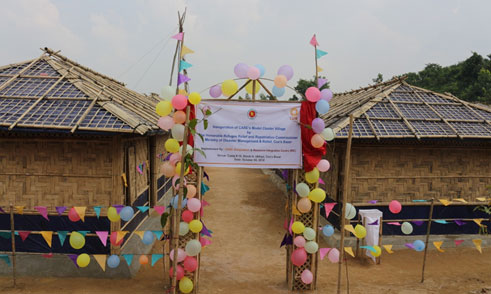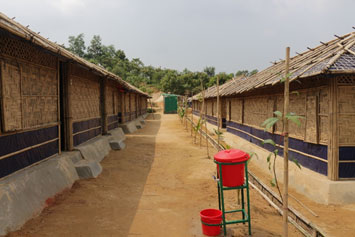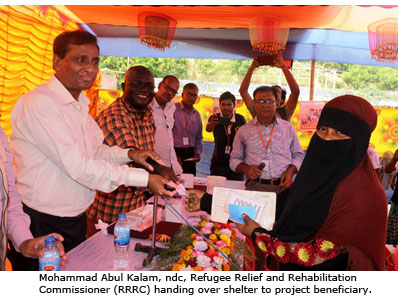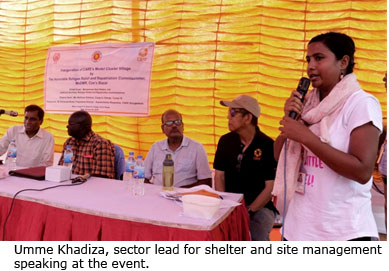
Cox’s Bazar, Bangladesh (October 4, 2018) - Myanmar refugee crisis is a one of the major humanitarian crises in the world at present. More than half a million people have crossed international borders to come to Bangladesh to escape from the communal violence in northern Rakhine state. The refugees are in constant need of monsoon and cyclone resilient shelters, WASH, cooking materials and protection in their daily lives. Government of Bangladesh and humanitarian aid agencies have been working together for the last one year to address these problems, with minimum resources for maximum initialization.
In this regard CARE Bangladesh has piloted a community-based cluster village approach with all the facilities including shelter, WASH and community kitchen as part of site management interventions. CARE Bangladesh is the leading agency for site management in Camp 16, otherwise known as Potibunia/ Shafiullah Kata.
With the aim to ensure better protection and dignity of the affected people, CARE initiated a unique and integrated community-based cluster village approach. Through this initiative CARE integrated multiple sectors including Shelter, WASH, GBV and Protection as part of site management while also undertake community risk mapping, cluster village planning, and ensure implementation is done in close collaboration and partnership with the GoB, and other key stakeholders.
 The Model Cluster village adopted the GoB approved midterm shelter (MTS) design along with basic facilities including water points, latrines, community kitchen, street lighting, drainage and pathways. CARE plans to construct 1,260 household shelter based on the Government approved Mid Term Shelter (MTS) and Transition Shelter (TS) Design. The main difference between the MTS and TS is that previous designed were not strong to withstand cyclone and monsoon rains. In addition, they were not spacious and clean.
The Model Cluster village adopted the GoB approved midterm shelter (MTS) design along with basic facilities including water points, latrines, community kitchen, street lighting, drainage and pathways. CARE plans to construct 1,260 household shelter based on the Government approved Mid Term Shelter (MTS) and Transition Shelter (TS) Design. The main difference between the MTS and TS is that previous designed were not strong to withstand cyclone and monsoon rains. In addition, they were not spacious and clean.
The new design is made of concrete pillars, cemented floors and each MTS is partitioned into two-rooms which gives a bit privacy for the women and girls and the/or the family. In addition, the model village has MTS and other facilities including gender segregated toilets, bathrooms and communal kitchen for 52 HHs. In constructing the new type of shelters, CARE ensured the shelter was compliance with preservation of the natural environment. 
To inaugurate the new midterm shelters and handover accommodations to the refugees, CARE Bangladesh organized a launching ceremony on October 4, 2018 at Block H, Camp 16. The event was attended by Mohammad Abul Kalam, ndc, Refugee Relief and Rehabilitation Commissioner (RRRC) as chief guest and Mahfuzar Rahman, Camp-in-Charge of Camp 16 as special guest. Emmanuel Minari, Programme Director - Humanitarian Response (Cox’s Bazar), moderated the event while Cox’s Bazar team from CARE Bangladesh also took part in the event
Umme Khadiza, sector lead for shelter and site management said, “We have targeted to cover 1,260 households with our current funding through this model; the cluster village model creates more scope to address community needs adequately and ensure maximum coordination for resource utilization”.
Mahfuzar Rahman also expressed his contentment about the new intervention and said, “The cluster village will ensure a better environment for the Forcibly Displaced Myanmar National (FDMNs) with more protection and dignity.”
 In his opening remark, Mohammad Abul Kalam said, “I am very happy with the Model Cluster Villages especially the way CARE Bangladesh has taken care of environmental conservation. The quality of the midterm shelter is good. I have spoken to the community about the cluster village and they said that they are happy with it.”
In his opening remark, Mohammad Abul Kalam said, “I am very happy with the Model Cluster Villages especially the way CARE Bangladesh has taken care of environmental conservation. The quality of the midterm shelter is good. I have spoken to the community about the cluster village and they said that they are happy with it.”
Fatema, one of the beneficiaries of this initiative explained her happiness saying, “The houses we stayed in for a year were made of tarpaulin and did not have any windows. It was hot, and staying inside was very difficult, especially for the small children. With the new houses, I am very happy and the environment here is also very nice.”
In his thank you note, Emmanuel Minari said, “with the continued support of Government of Bangladesh, CARE has been able to provide support to the FDMNs since the beginning of the crisis which started in August 25, 2018 in the Rakhine State of Myanmar. CARE looks forward to strengthen the collaborative effort like this which involves the coordination of people, public and private actors to ensure a more livable environment for the violence affected people.”
Photos: Asafuzzaman Captain/CARE